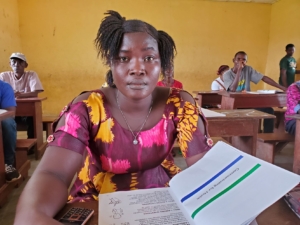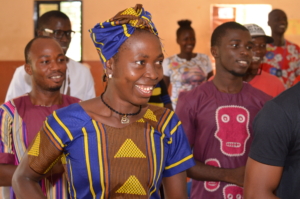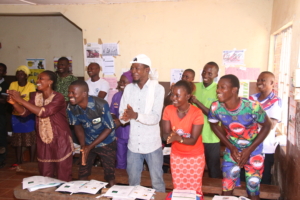“We don’t have a health facility in our community,” says Fatmata Koroma, a mother of two. Living in the community of Ndogboi in Sierra Leone’s Kono District, she felt called to apply for training when the Ministry of Health and Sanitation began recruiting a new cohort of community health workers. “Seeing the suffering of children and women in the community, health issues are many,” she reflects. “As a community health worker, I will do things as I’ve been trained–treat children, visit pregnant women and help them access health facility, serve the community.”
In Sierra Leone, there is only one doctor for every 40,000 people. For millions of people living in rural and remote communities, community health workers represent a vital link to lifesaving care. But until the Ministry of Health and Sanitation embarked on an ambitious new effort to recruit and train a new cohort of community health workers, with support from a coalition of partners including Last Mile Health, the system had been fragmented.
“We had TB community health workers, HIV community health workers, we were using all different community health workers to do the same work,” explains Elizabeth Musa, National Coordinator of the National Community Health Workers Program. “We realized it was not effective. We were advised to do integration. This means there is one training curriculum. We’re also adding supervision. The reporting system is also going to be improved. The programs are now integrated into the national program.”
“If the community health worker is trained well, we are expecting them to perform better.”
As the Ministry recruited the new national cohort, Last Mile Health worked alongside the CHW Hub to strengthen and revise the community health worker training curriculum. Facilitators, quality assurance officers, and monitoring and evaluation officers received training in the revised, evidence-based curriculum, with the aim of ensuring training would be standardized and effective across all training sites–and that data could be reviewed, analyzed, and leveraged to improve future trainings. Next, training began for over 8,000 new community health worker candidates who now serve all 16 of Sierra Leone’s districts. “The quality of training is improved,” says Elizabeth. “If the trainer is trained well and has more capacity, that capacity should be passed to the community health worker–and if the community health worker is trained well, we are expecting them to perform better.”
Anuoluwa Ishola, who served as Last Mile Health’s Sierra Leone Program Director through September 2022, adds, “There’s a level of intentionality that’s gone into thinking through what this new national CHW program will look like. For one, there’s been a more targeted approach in what role the community health worker will play, as well as how they’re going to be supervised and assigned to health facilities. All of this is working toward making sure there’s quality training and that the level of community health workers coming out of the program are able to deliver within their communities.”
With a standardized and monitored training curriculum, regular supervision, and an integrated package of primary health skills, Sierra Leone’s new national cadre of community health workers is equipped for success. “They can work better, provide quality services,” says Elizabeth. “The patients are seen earlier, treated earlier. If they can do something at an earlier stage, disease and disability will be reduced.”
For new community health workers like Fatmata, the training and support she receives will help ensure she provides the best possible care to her patients. “I am happy to become a community health worker, and I’m happy about the training because I know I will learn a lot of things I didn’t know before,” she says. “I will now be in the position to help my community.”
She is excited to use what she has learned. “I will work with them to seek the well-body of the children, women, and the community,” she promises. “I will inform them how they should bring their sick children to me for treatment, but I will refer or accompany them to the health facility if it is a serious case that I can’t treat. I will use the skills I have learned to help the community.”







